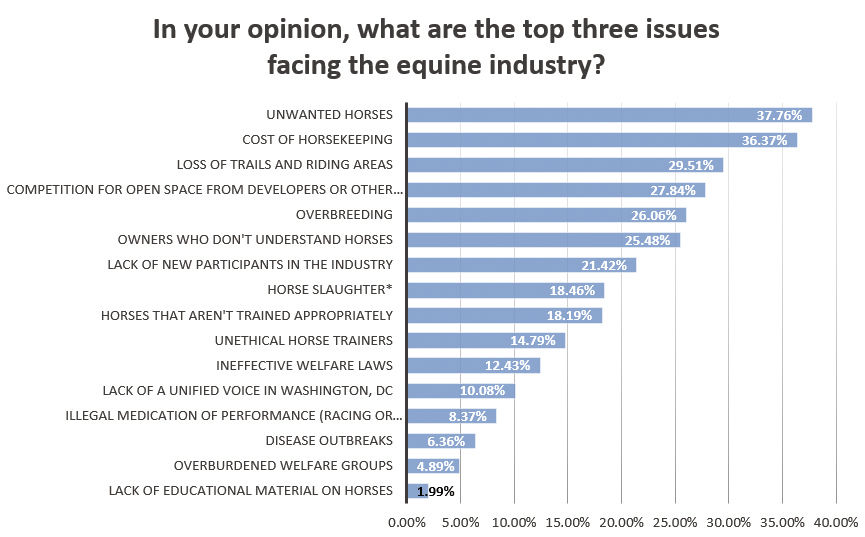Horse owners are relying on their veterinarians more and more for vaccination and deworming program recommendations, according to the 2018 American Horse Publications online survey, sponsored by Zoetis. Survey respondents said equine veterinarians are the No. 1 influence on horse-owner product purchase decisions for both vaccines and dewormers. The online survey collected responses from more than 9,000 horse owners across the United States from January through April. Geographic regions of the United States were almost uniformly represented among participants.
Jill Stowe, Ph.D., associate professor of agricultural economics at the University of Kentucky, analyzed the data and consulted on the results.
“The percentage of respondents who said they discuss American Association of Equine Practitioners vaccination recommendations with their veterinarians nearly doubled from the last AHP survey in 2015,” Stowe said. “Also, this year’s survey showed more respondents are deworming less frequently, which suggests that more horse owners and managers are adopting the approach of utilizing fecal egg count tests and deworming according to individual FEC test results.”
Key horse health findings
Increased protection through vaccinations
Survey participants reported increasingly seeking their veterinarian’s guidance on vaccinations to protect their horse from disease. As such, a majority of horse owners polled (63 percent) reported vaccinations purchased through, and administered by, their veterinarian—an increase that continues from results reported in the two surveys conducted in 2012 and 2015 (58.2 percent and 61.4 percent), respectively. Of owners who vaccinated their horses themselves, a majority of respondents (70 percent) said their veterinarian was the No. 1 influence for where they purchase their equine vaccines. Also, nearly 50 percent of those who participated in the survey reported discussing vaccination recommendations from the AAEP with their veterinarian. This is an increase of nearly 20 percentage points since the previous survey, which was conducted in 2015.
Vaccination remains critical against the five core equine diseases—rabies, Eastern equine encephalomyelitis, Western equine encephalomyelitis, tetanus and West Nile. Survey results demonstrated a slightly higher percentage of horse owners vaccinating for rabies. Among equine risk-based vaccinations administered once per year: 80 percent of horse owners who participated in the survey vaccinated for equine herpesvirus and equine influenza, 40 percent vaccinated against strangles and nearly 20 percent protected against leptospirosis.
“Equine wellness requires a dedicated team, from efficacious products to trusted guidance from your veterinarian,” said Kevin Hankins, DVM, MBA, managing veterinarian, Equine Technical Services, Zoetis. “By working closely with your veterinarian, you can rest easy knowing your horse is best protected from core disease risks, which can be more than a risk— they can be a death sentence for unvaccinated horses. Only vaccination helps provide the protection a horse needs.”
More strategic deworming practices
As seen with vaccinations, the AHP survey showed an equine veterinarian’s role continues to increase in deworming protocols, as well. Half of the horse owners participating in the survey reported veterinarian involvement in developing their horse’s deworming schedule. Additionally, nearly 78 percent of survey respondents indicated their veterinarian recommended an FEC test, compared with less than 50 percent in the past two surveys. Nearly 63 percent of respondents reported having had an FEC test performed for at least one horse.
Parasite resistance continues to be a fear for horse owners, with 80 percent of respondents noting their concern. Their responses within the questionnaire suggest they are taking steps to prevent parasite resistance in their horse. Since 2015, the percent of respondents reporting that they deworm their horses once, twice or three times a year has increased.
“These results show an increase in responsible deworming practices,” noted Kenton Morgan, DVM, managing veterinarian with Equine Technical Services, Zoetis. “When a horse is dewormed too often, horse owners risk inadvertently doing more harm than good by increasing their horse’s risk for parasite resistance and, as a result, ineffective deworming treatments in the future.”
Additional Insights from the 2018 AHP Survey
The relationship between humans and horses
The majority of participants indicated that they consider their horse a companion animal or pet (71.84 percent). And interestingly, data suggested a correlation between the perception of the horse-and-human relationship and the age of the horse owner. As the respondents’ age increased, they were less likely to view their horse as a best friend, companion animal/pet, family member or performance partner.
The unwanted horse remains an industry challenge
As in the 2010, 2012 and 2015 surveys, the concern for “unwanted horses” remains the most significant challenge facing the equine industry today, according to 37.8 percent of survey participants. However, the percentage of respondents choosing this option was significantly less than prior surveys. A close second was the cost of horsekeeping (36.4 percent).
Upon analyzing this finding, Stowe provided the insight that, “Industry participants have made great strides in addressing important issues, such as the unwanted horse issue, and now have their sights focused on additional challenges, such as the scarcity of riding areas and open spaces.”
About the survey
The survey marked the fourth online nationwide equine industry survey by the AHP. Conducted every three years, the survey gauged ongoing trends and management practices across the U.S. equine industry and identified critical issues facing the equine industry, thus providing the opportunity to better understand current approaches to horse health.
To request a summary of the 2018 AHP Equine Industry Survey sponsored by Zoetis, contact the AHP office at [email protected] after Oct. 1, 2018. Excerpts from this study must be referenced as “2018 AHP Equine Industry Survey sponsored by Zoetis.”



